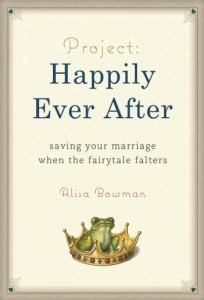Want to Save Your Marriage?
 Almost everyone who is thinking about or going through a separation or divorce wonders if the marriage can be saved. Today I’m happy to share a conversation with Alisa Bowman, author of Project: Happily Ever After: Saving Your Marriage When the Fairytale Falters. Alisa found herself so unhappy in her marriage that she was fantasizing about her husband’s funeral. Divorce was on her mind when a friend asked her if she had done everything possible to save her marriage. She realized she hadn’t and embarked on a four-month plan to save her marriage herself by reading self-help books and trying everything from bikini waxes to communication exercises with humor and open-mindedness. As a result, she fell back in love with her husband and they renewed their vows. Alisa’s path won’t work for everyone, but it is definitely something to consider.
Almost everyone who is thinking about or going through a separation or divorce wonders if the marriage can be saved. Today I’m happy to share a conversation with Alisa Bowman, author of Project: Happily Ever After: Saving Your Marriage When the Fairytale Falters. Alisa found herself so unhappy in her marriage that she was fantasizing about her husband’s funeral. Divorce was on her mind when a friend asked her if she had done everything possible to save her marriage. She realized she hadn’t and embarked on a four-month plan to save her marriage herself by reading self-help books and trying everything from bikini waxes to communication exercises with humor and open-mindedness. As a result, she fell back in love with her husband and they renewed their vows. Alisa’s path won’t work for everyone, but it is definitely something to consider.
Was divorce a real consideration for you, and if so, what were your thoughts about it?
I did think about it a lot. My thoughts were basically that I was scared. I was scared to stay married because I was miserable, but I was also scared of divorce. I imagined that I might be happier if I got divorced, but I worried that I also might not be. What if I felt guilty? What if it didn’t solve my problems? For instance, what if, after divorce, I ended up having to support my husband financially anyway? I worried about whether my husband would be any sort of a father to our child if the marriage ended. What was worse for our daughter? Us staying married and me being miserable–but her having a shot of a relationship with her father? Or us divorcing and him possibly completely dropping out of my life and hers?
I was scared of what other people would think, especially his side of the family. I was even scared of the men my mother no doubt would try to fix me up with and the inevitable fights that she and I would get into over it. In the end, I worked on my marriage because a divorced friend suggested I do so–mostly as a test to see if my marriage could or count not be saved. As it turned out, it could.
You visualized your husband’s funeral, but did you visualize your divorce? What was it like? Why was this fantasy not as satisfying as the funeral?
I did fantasize about the divorce, but this fantasy felt artificial to me. My divorce fantasy was all about me having a life again. If he had custody on Tuesdays, Thursdays and every other weekend, I’d actually be able to exercise regularly again, go to a yoga class and even read books again. I’d also be able to do a lot of things that were uncomfortable for us to do while unhappily married. For instance, I’d be able to go to family gatherings again without everyone rolling their eyes about whatever hurtful comment my husband had just made. I’d also be able to decorate the house the way I wanted–without having to consult him or talk him into things. My divorce fantasy was really about freedom–the freedom to be the person I wanted to be. Eventually I realized that I could be that person without actually getting divorced.
How different would your life be now if you had gotten a divorce? Would it be all bad or would there be positive aspects?
This is a hard question for me to answer because I’m in love with my husband again. So now when I think of divorce, it hurts and I think, “Oh I would miss him so much.” And now I tend to notice what I WOULDN’T have if we were divorced. For instance, he really does change all the light-bulbs, especially the funny odd kinds that you can’t find in a normal store. He also unclogs the drains and he fixes my car for me. Sure, I am perfectly able to do such things on my own, but I don’t enjoy them. So I’m thankful that I have him around!
Had we divorced when we were unhappy, I’m sure I wouldn’t be thinking any of that, though. I have a feeling that I would have found a way to be happy no matter what. That’s the way I am. I am a problem solver. So if the marriage ended, I would have figured out how to share custody, for instance, in a way that worked. I would have found ways to be a better, more content me. I would have broken down and learned how to use the dang grill. I would have hired someone to deal with the lawn. I would get a plumber to unclog the drain if it came down to it. And I definitely would put some effort into making sure I didn’t make the same mistakes with my next relationship.
I will say that it probably would be nice to be able to decorate the house the way I want without having to consult anyone. That’s the one aspect of divorce that I still find a little intriguing. If I were super rich, I would buy two houses side by side and have him live in one and me in the other and then we would just visit a lot. That way I could decorate my side the way I want it!
Do you believe every marriage can be saved in the way you saved yours? Were you just lucky or do you think the steps you took are applicable for many people facing the breakdown of a marriage?
I think some marriages can be saved and some can’t. It’s hard to sort them into neat categories of “can’t be saved” and “there’s no hope in hell” though. I think whether or not a marriage can be saved depends on a few factors: 1) Did you really fall in love? If you married for some other reason than love (convenience, fear, boredom, money) and you’ve lost that original reason, there might not be anything there to salvage 2) Whether you are willing to see your part 3) Whether your spouse is willing to see his/her part? 4) Whether you are willing to learn and go out of your comfort zone–because saving a marriage requires you to be vulnerable, to learn a new style of communication, and to accept what won’t change.
What lessons can be taken from your journey and used by people who are already divorced and are trying to co-parent and co-exist with their exes? Is there a happily ever after apart?
I think it’s always useful to look back and try to see your part. It’s easy to blame a failed marriage on your spouse, but that sort of blame isn’t going to help you grow and it’s not going to help you in your next relationship. It’s also not going to help you co-parent. Did your communication style cause your spouse to shut down? Rather than blame him for shutting down, go deeper and think about what about your strategy itself led to him shutting down. Similarly if she didn’t support your goals, think about why. Did you not help her to understand them? In a marriage, both people play a role, and these roles become intertwined. Figure out what your role was and think about how it could have been different.
Alisa Bowman is the author of Project: Happily Ever After, a memoir of how she saved her marriage. She’s also the creator of ProjectHappilyEverAfter.com, a safe gathering spot for recovering divorce daydreamers.




